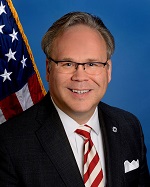 Source: Shutterstock.
Source: Shutterstock.
In his first in-person event since the CUNA Governmental Affairs Conference in 2020, NCUA Chairman Todd Harper spoke to attendees of the Defense Credit Union Council's Annual Meeting in Naples, Fla., on Thursday.
During the speech, while praising the efforts and successes of credit unions during the economic crisis caused by the COVID-19 pandemic, he said he believes the economic outlook for the rest of the year and into 2022 looks favorable. However, he cautioned those at the conference, "We're not out of the woods just yet."
Recommended For You
"Credit union performance will continue to be shaped by the fallout from the pandemic and its financial and economic disruptions," he said. "With pandemic-relief efforts like supplemental unemployment benefits, foreclosure prevention programs, and eviction moratoriums coming to an end, many households could face financial stress in the coming weeks and months. This could lead to higher delinquency and charge-off rates and potential losses for credit unions — and even failures," he said.
Harper also mentioned the potential stress on the Share Insurance Fund, which he has discussed openly for months. "Accordingly, credit unions should pay careful attention to capital, asset quality, earnings and liquidity," he said.
 Todd Harper (Source: NCUA)
Todd Harper (Source: NCUA) Recently, Harper testified before the Senate Banking Committee about his hopes that Congress would change the statutory provisions in the Federal Credit Union Act to enable the NCUA board to proactively manage the SIF.
During his speech, Harper talked about his concerns for members who continue to struggle financially as the pandemic wears on. To help those members, Harper encouraged credit unions to look at their overdraft fee practices and either reduce or eliminate those fees.
"In my view, the overdraft fee practices of some federal credit unions are fundamentally detrimental to members and inconsistent with the definition of 'federal credit union' in the Federal Credit Union Act: 'A cooperative association organized … for the purpose of promoting thrift among its members and creating a source of credit for provident or productive purposes.' Overdraft fee programs can make it harder for members to regain their financial footing, and households hit by persistent overdraft fees often have their checking accounts closed. This, together with Black and Hispanic consumers being disproportionately harmed by overdraft fees, leads to financial exclusion, not financial inclusion," he said.
"The pain for these communities is real," he continued. "That's why I am pleased to see credit unions and other financial institutions stepping up to eliminate or significantly decrease their overdraft fees. I encourage more credit unions to do the same so that we can help credit union members who are in harm's way."
Last month the Madison, Wis.-based UW Credit Union announced it reduced overdraft fees and non-sufficient funds fees by more than 80%, with the goal of creating a more equitable banking experience for everyone, while also supporting the financially vulnerable.
Two weeks later, the $14 billion Alliant Credit Union in Chicago announced it had completely eliminated all overdraft and non-sufficient funds fees for its members. At the time of the announcement, Alliant President/CEO Dennis Devine said, "Our biggest priority is doing what's in the best interest of our members, and that means challenging historic norms like overdraft and non-sufficient funds fees."
© 2025 ALM Global, LLC, All Rights Reserved. Request academic re-use from www.copyright.com. All other uses, submit a request to [email protected]. For more information visit Asset & Logo Licensing.






